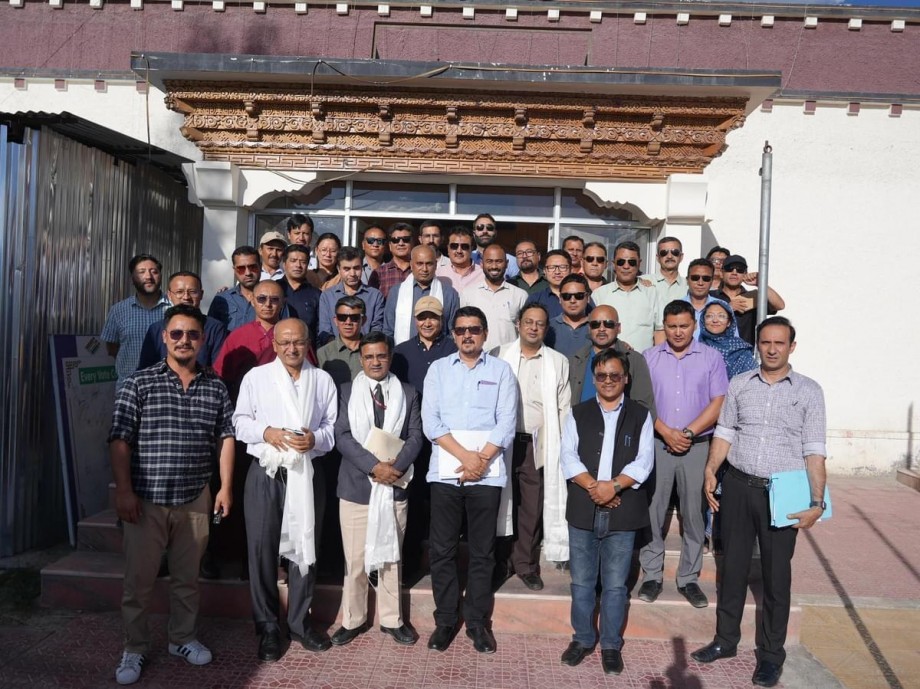CEC Tashi Gyalson advocates for enhanced funding and autonomy in meeting with Finance Commission

5th Finance Commission, led by Chairman Anil Kumar Jha, IAS (retd), with members Prashant Goyal; Dr. Amey Sapre, Associate Professor; and Binay Bhushan, Secretary, convened a meeting with Hill Council Leh on August 9.
Chairman/CEC Adv Tashi Gyalson, Executive Councillors, Deputy Commissioner/CEO Leh, and representatives from the Rural Development Department, Urban Local Bodies, and various District Officers were also present.
The meeting began with CEC Tashi Gyalson recounting the history of the council's formation, highlighting the progress made since it became a union territory and reflecting on its development prior to attaining that status. He highlighted the significant progress in various sectors since attaining union territory status.
Hill Council Leh submitted an extensive set of recommendations to the Finance Commission, aimed at addressing critical local needs and enhancing governance.
The council has advocated for a dedicated Grant-in-Aid to support the maintenance of Jal Jeevan Mission (JJM) infrastructure, emphasizing the need for consistent funding to ensure its sustainability. They have also highlighted the importance of routing Grant in Aid and other funds directly through the council to streamline distribution and ensure effective utilization.
A significant part of the proposal includes funding for special projects tailored to LAHDC’s unique requirements, alongside mechanisms for Councillors to retain revenue generated locally. This revenue, combined with funds from land premiums and other sources, is seen as vital for supporting development initiatives and managing rising costs of living in the region.
Addressing the challenges faced by local farmers, the council has proposed waiving Kisan Credit Card (KCC) loans due to adverse agricultural conditions. In addition, the need for a transport subsidy was put forward to alleviate high transportation costs, while special incentives for the tourism industry were recommended to boost economic growth and create employment opportunities.
The council has also emphasized the necessity for enhanced social security support, particularly given the lack of adequate medical facilities. They called for measures to ensure proper care and evacuation in serious health situations.
On the financial front, the council has requested an increase in financial autonomy to LAHDC, Leh and proposed streamlining processes for Technical Sanction and Administrative Approval to expedite project implementation. Additionally, they have sought grants for sustainable agriculture, horticulture, and livestock rearing to promote self-sufficiency and environmental stewardship.
To better manage locally generated revenue, the council has recommended creating a deposit head for LAHDC, Leh. They also called for an enhancement of the District Capex Budget, aiming to support extensive infrastructure and development projects.
The discussion also emphasized the need for advancing organic farming in Ladakh and strengthening micro enterprises. The council proposed that the region should utilize more local products.On the topic of revenue, the council suggested that revenue generated by local councils should remain with them to serve as an additional funding source for community projects and welfare activities. CEC Gyalson raised concerns about tendering practices and strongly advocated for reserving tenders valued below 5 crore INR for local businesses. This approach is also intended to prevent delays and enhance project effectiveness.Moreover, recognizing the high literacy levels in Ladakh, there was a call for increased employment opportunities through the filling of gazetted and other posts to better meet the needs of local departments.
Deputy Commissioner Santosh Sukhadeve acknowledged these recommendations, offering explanations regarding ongoing projects, schemes, and addressing concerns about delays.
The Finance Commission assured the Chairman and the Councillors that all recommendations and concerns would be thoroughly reviewed and considered. This engagement marks a collaborative effort to address regional developmental needs and enhance local governance.





